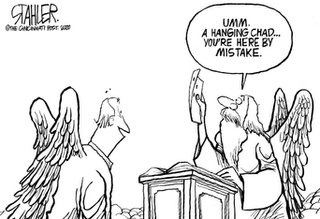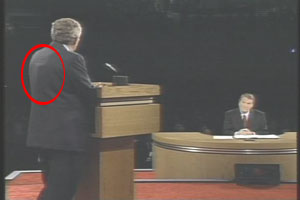A Manifesto For Government Reform Part 3 of 4
Problem #3: The Hanging Chad

We all remember the hanging chads. That iconic symbol of just how archaic, unfair and broken our electoral system was (and still is). We all know most of the issues here and I won’t waste bits and bytes rehashing them all. What I will say is that electronic voting is light-years ahead of paper punch. However, as any company that has migrated from paper filing to computer systems will tell you, it ‘ain’t a no-brainer. There are a myriad of problems when a paper ballot become a series of bits on a hard drive. A couple of these problems include outsourcing the development and monitoring of electronic voting systems, or administrators who don’t understand the programs and how the systems work. The process by which contracts for computer voting systems are awarded is an area that, left unchecked, is ripe for abuse. How are recounts administered? Should we supply voters with paper printouts? Fraud is much easier when one moves from the paper world to the cyber world. Ideally, election reform should actually fix the system rather than breaking it further. People joked after the last presidential election that Diebold, longtime Bush contributors, "programmed" their electronic voting machines such that all votes were fed to Karl Rove’s laptop computer.

(By the way, did we ever figure out whether Dubya was wired for audio assistance during the second presidential debate?)

Hopefully, the Diebold joke was just that but it does, at an extreme, highlight the potential for abuse and the ease of computerized vote tampering. Regardless, I think that getting rid of hanging chads is a good start.
More importantly, we should develop a national “Voter’s Bill of Rights”. This should include better-trained and more closely monitored poll volunteers, as well as easier access for elderly, handicapped and others who need assistance getting to polling stations. And by all means, relatively short wait times for all voters. Local election commissions should be held accountable if they overly restrict the access of “certain” voters, engage in outright voter intimidation, or create unreasonably long lines at “certain” polling locations. We can pretty much all agree that these things are inexcusable but in reality there have been few negative consequences for those who undermine the election process. Now I realize many localities are financially strapped and for this reason, are not able to accommodate large numbers of voters. It is for this reason that the way we fund the voting process needs to change. I’m not sure there is an easy answer to this problem but perhaps we should take some of the obscene amounts of money currently lining the coffers of the candidates and funnel some of it to pay for the election process itself, so that ALL districts can afford to properly plan, manage, and monitor their polling places. We have to send the message that anything less than free and fair voting for all will not be tolerated. If Fedex can manage to deliver a letter anywhere in the world in less than 24 hours and do it every day of the year – than all citizen, regardless of race, locality or socioeconomic status, should be able to cast a vote within an hour, one day out of 730.
To be continued...

0 Comments:
Post a Comment
<< Home